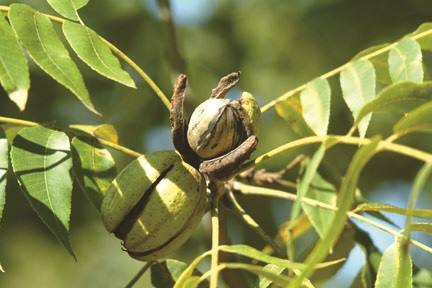Organic Pecans? Conventional Pecans? Farm-Grown Pecans? Ask the Experts!
Consumers increasingly care about not only about where the products they buy and feed their family come from, but also how they are grown and manufactured. Here at Sunnyland Farms, we couldn’t be more thrilled that people are starting to educate themselves about these important topics.
From the perspective of pecan farmers and pecan experts since 1948, we can tell you that when you buy direct from shellers, pecan farmers, and growers, it means you’re getting the best quality, for the best price.
But with newer terms in the market you’ll find like “organic pecans,” “local pecans,” “non-GMO pecans,” “natural pecans,” and “farm-grown pecans,” this can understandably lead to confusion about what to buy.
(Image description: pecans are unique in that they’re double-protected: first in the shuck, then by a shell)
While the term “organic” often gives a sense of security, “organic pecans” may not be all they’re cracked up to be (pun intended!).
To help explain a little more about organic pecans, nuts, and other foods, we reached out to Kari Martinez, an Atlanta-based Registered Dietician, who gave us a few points to consider to make healthy decisions.
 Here are 3 things she explained to us about organic foods:
Here are 3 things she explained to us about organic foods:
1. There are certain conditions and times when it’s important to buy organic, but other times when it’s not as important.
Some people choose to buy all organic food items, all the time. That’s great! However for many of us, that can be cost prohibitive, and sometimes just not necessary. With that being said, there are certain times when you should choose organic over non-organic foods. A perfect example of that are the “Dirty Dozen™” and “Clean 15™” foods that many Americans are familiar with.
The Dirty Dozen™ and Clean 15™ refer to lists of food items put together by the EWG (Environmental Working Group). They are designed to help consumers reduce pesticide exposure by sharing which produce to buy organic, and which to buy conventional:
· The Dirty Dozen™ refers to the fruits and vegetables with the most pesticides. The top 3 currently on the list are strawberries, spinach, and kale. One of the reasons these are marked so high, is because in each of these examples you’re eating what dietitians call “surface area food.” You’re eating the whole of the food.
· The Clean 15™ on the other hand, refers to fruits and vegetables with relatively few pesticides detected on the foods. The top 3 currently on this list are avocados, sweet corn, and pineapples.
Important Note about Organic vs Conventional Produce
Something important Kari likes to note to her clients is that fruits, vegetables, nuts, and seeds, no matter how you buy them, are important for a healthy diet. As the EWG states, “All research agrees on the health benefits of a diet that includes fruits and vegetables, and eating fresh produce – organic or conventional, as budget allows – is essential for health.”
Make decisions about what to buy organic based on the foods you eat frequently. For example, say you eat apples and strawberries daily and those are your favorite fruits. Because you eat them all the time, you should, when possible, buy them organic. If you only eat apples a few times a year in the fall, for example, it’s really not something you have worry about.
Where do Pecans and Nuts Fall on the EWG List?
While there are many foods that are beneficial to buy organic, the Dirty Dozen™ list often doesn’t contain pecans because they’re so far down the row.
Upon looking up the big grocery store pecan brands the EWG has listed, most of them fall at Level 2 (on a scale of 0-10 and 10 being the highest), which is the low range of pesticides. Nuts without shells, like peanuts, are listed higher. Walnuts, like pecans, have a thick shell, so they’re lower on the list and overall receive better grades.
To sum up, while consumers need to be mindful of the amount of pesticides we consume, nuts overall are not a major source of pesticides in our diet.
2. Studies Do Not Indicate There Is a Difference in the Nutrient Content of Organic Pecans vs Non-Organic Pecans.
As a registered dietitian, I am a firm believer that you should choose foods with higher quality nutrients in them. That fact is hard to argue.
According to a study out of Stanford, research does not clearly indicate that there is a difference in the nutrients in organic foods vs conventional foods. While of course, consumption of organic foods can reduce pesticide exposure, the research “did not find strong evidence that organic foods are more nutritious.” A second study lead by the British Journal of Nutrition (BJN) repeated the analysis and had similar findings regarding nutrients.
While the scientific debate on organic and conventional is passionate and likely to continue, all researchers and dietitians agree on one message: most Americans are not getting the recommended servings of fruits and vegetables regardless, so eating plenty of these foods in any form is important for health.
Wondering about the nutrition in a pecan? Pecans are loaded with health benefits: antioxidants, healthy fats, more than 19 vitamins and minerals, fiber, and protein.
3. Consider Organic When Food is Shipped Around the World or Sits on Shelves.
The final point Kari gives for us to consider when to buy organic versus conventional, is when you’re buying food that is imported or has added chemicals to preserve shelf life.
Imported food has been steadily increasingly over the years. The New York Times reported that more than half of the fresh fruit and almost a third of the fresh vegetables Americans buy now come from other countries.
The article states that growth has been attained in part due to “improvements in roads, containerized shipping, and storage technology.”
According to the U.S. Food and Drug Administration (FDA), they are not “authorized under the law to approve, certify, license, or otherwise sanction individual food importers, products, labels, or shipments” although “both imported and domestically-produced foods must meet the same legal requirements in the United States.”
Food that sits on a grocery shelf or has been shipped all around often necessitates adding preservatives and chemicals. More pesticides and chemicals may be used to protect food during the transfer. You may also see chemicals listed on a nutrition label “to preserve freshness.”
The addition of artificial ingredients—food dyes, preservatives, chemicals—is not good for you overall and can mess with your gut flora, which can cause inflammation, leading to other issues. It also gets harder on our liver to digest.
In these instances, choosing either organic or U.S.-grown food from smaller farms, may be better options.
When you buy direct from a farm, like at Sunnyland Farms, you’re getting that direct connection. People are more than happy to pick up the phone, answer your questions, and talk about the farm and how its products are made.
Final Comments from Kari Martinez, R.D.: Transparency and Education
It’s easy to see why trying to educate yourself and make healthy choices be confusing. Terms such as “farm-fresh,” “natural,” or even “cage-free, “are widely used in the marketplace. These are legitimate terms that are regulated by FDA under the authority of the Federal Food, Drug, and Cosmetic Act, but there is no real standardized definition. There are a lot of nuances that are overlooked.
Surprisingly, the FDA does not even regulate the term “organic”. There is a separate regulating board that overseas the standards for organic. You can read more at this website: https://www.fda.gov/food/food-labeling-nutrition/organic-food-labels
Bottom line is that buying organic is good. But when it comes to deciding “should I buy organic pecans?” versus evaluating other factors, the other factors may weigh heavier and win out.
Finally, look at a variety of trusted sources. When you think of researching to make food choices, everyone turns to “Dr. Google” to get their answers, right? While Google can be helpful, people need to do their research to make sure their information is coming from a reputable source.
Organic Pecans, Fresh Pecans, and Locally Grown-Georgia Pecans
Now let’s turn to the farm experts at Sunnyland. Here are a few facts about Georgia pecans:
· Insects can be a big problem on any farm. In Georgia, controlling pests is a reality as our climate is humid and hot with long summers. However many farms, including Sunnyland, control with a spray, versus through the root system. When farmers package and ship directly to consumers on-site (like we do at Sunnyland Farms) it minimizes the amount of additional sprays or gas that are used with pecans and other nuts which are sent off to be packaged and distributed
· Pecans grow not only in the hard brown shell most consumers are familiar with, but that shell is also encased by a large green shuck during the growing and spraying season. This makes a pecan much less susceptible to the pesticide than a fruit like an apple, strawberry, or peach that has the pesticides applied to the edible portion. Some organic pecans are becoming available but they are primarily grown in Mexico and are definitely not a quality that we could sell.
 (Image Description: This shows what a ripe, ready to harvest pecan looks like. When the husk or shuck opens fully it reveals the hard shell of the nut. When this process starts we know that harvest will soon be under way.)
(Image Description: This shows what a ripe, ready to harvest pecan looks like. When the husk or shuck opens fully it reveals the hard shell of the nut. When this process starts we know that harvest will soon be under way.)
· Over the years, we’ve been steering our products more towards minimal ingredients. For example:
· Our pecan butter is made with no added palm oil; only our fresh pecan pieces, real butter and just a touch of honey
· Our Vintage Pecan Duet (“Simply Cinnamon Pecans” and “Lavender and Orange Flavored Pecans”) contain nothing artificial – no artificial flavorings, and no preservatives
In a Nutshell….
In a nutshell, you want the best.
Organic pecan farms are not the only option you have when choosing healthy products that are served with quality, freshness, and transparency. If you’re looking for fresh, quality, farm-to-table pecans, we hope you consider us at Sunnyland.
As a family-owned business, we still keep our hands in every part of the process: from harvest to shelling, packaging to shipping, there’s pride in ensuring we deliver quality, and what we consider to be the best-tasting pecans you’ll find anywhere. That dedication, coupled with our renowned customer service and free shipping, makes us stand behind our tagline: “Only the Best.” Try us today!
About Kari Martinez
Kari is a Licensed and Registered Dietitian (LD, RD) and holds a M.S. in Nutrition and Public Health and a B.S. in Exercise Science and Health Promotion. She has over twelve years of experience in the fitness and nutrition field, working with several corporate clients and many community sites delivering wellness programs and providing nutrition guidance. The past five years she has solely focused on clinical nutrition, with more of an integrative and functional nutrition approach. She primarily works with female clients helping with micronutrient deficiencies, inflammatory conditions, weight loss, hormone balance, and gastrointestinal issues. She believes that a simple, personalized diet and lifestyle interventions can help women (and others) find the energy, balance, and joy in their lives.
Kari worked in collaboration at a functional nutrition private practice office for over a year and recently just started her own private practice in January called Bloom RD. and is working with referral clients currently. She is a Certified Leap Therapist (CLT) and in process of completing a certificate of integrative functional medical nutrition therapy.